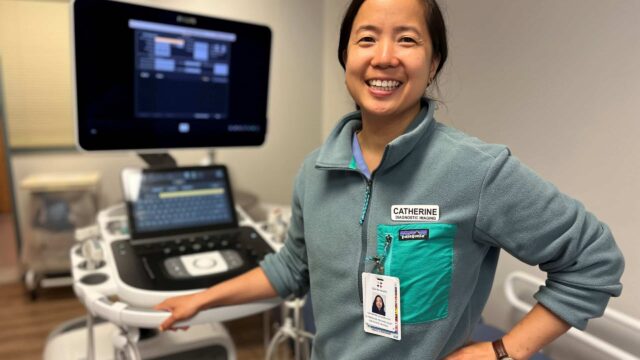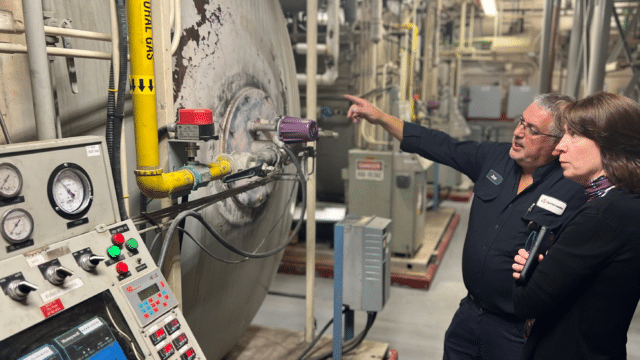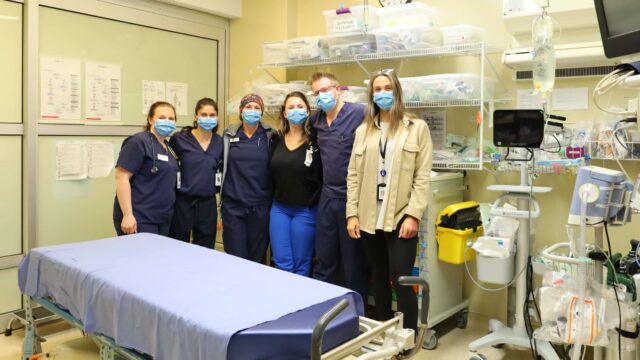A Team Effort—Celebrating Our Reduced ALC Rates
Anyone who works in health care knows it’s all about progress, not perfection.
At Quinte Health, our remarkable teams are caring for more patients than ever. In response to the increased demand, our staff and physicians are on the lookout for new and improved ways of doing things to ensure the patients we serve receive the care they need, in the right places. This means working in collaboration both inside and outside the walls of our hospitals to create healthier communities, together.
Over the past year, Quinte Health has achieved a remarkable 19% year-over-year reduction in our Alternate Level of Care (ALC) rates—a significant accomplishment. ALC refers to patients deemed ready for discharge but still occupying hospital beds. The implications of high ALC rates are profound: a large number of patients are awaiting another service level or destination, sometimes to long-term care (LTC), or home with homecare services, or even awaiting an alternate location for care at Quinte Health such as rehabilitation or complex continuing care. The result may be delays for other patients in need of admission or specialized care exclusive to hospitals.
“Compared to 2022, in 2023 we had 19% fewer ALC patients in our hospitals. Each ALC patient that we did have stayed in hospital for 10 days fewer than the average ALC length of stay in 2022,” said James Russell, Director of Clinical Operations and Diagnostics. “At a time when there are more patients, who are sicker than ever, seeking admission to our hospitals, this reduction in ALC patients has a big impact, helping to free up beds for patients in need of hospital-level care. Collectively, this equated to nearly 4000 more ‘bed days’ available for our most acute patients – a HUGE number.”
What has contributed to our successful reduction in ALC patients? Innovative practices, collaboration, and hard work. Here are some examples:
New model of care
In January 2022, Quinte Health launched a pioneering Medicine Model of Care at Belleville General Hospital and Trenton Memorial Hospital. Rather than physicians being the Most Responsible Provider (MRP) for all patients within the hospitals, additional nurse practitioners (NPs) joined the team as MRPs for post-acute patients. This significantly reduced the patient load for physicians, allowing them to focus on acute care while NPs provide care and attention to post-acute patients, working with their families, Home and Community Care Support Services (HCCSS) and Quinte Health’s stellar team of Patient Flow Coordinators to ready patients for their next destination.
Expanded options for early discharge
Quinte Health’s Transitional Care Unit is located at Quinte Gardens Retirement Residence. This 27-bed unit is designed for medically and surgically cleared patients from any Quinte Health hospital who no longer require acute care but are not strong enough to go home. Here, Quinte Health staff work with patients on mobilization and rehabilitation, removing patients from the hospital environment and readying them for the next phase of their care journey.
Quinte@Home, which was launched in February 2022, provides eligible patients with the support and care they need at home so they can feel safe and confident when they are discharged from the hospital. Quinte@Home is a partnership with SE Health, together creating a care plan and delivering vital home care services (nursing, therapies, personal support etc.) while also connecting patients to community support services such as Meals on Wheels, community transportation, and social/wellness programs. Since its inception, more than 120 Quinte Health patients have been safely discharged home, earlier, with the support of the Quinte@Home program.
Hard work and collaboration
Quinte Health’s Patient Flow Coordinators (PFCs) are proficient in identifying potentially complex discharges early by using a validated tool to score patients on admission. Complex patients are followed by the PFCs, and their care plans are discussed regularly with the clinical team and with the patients’ families to identify barriers to discharge. PFCs work closely and collaboratively with Home and Community Care Support Services (HCCSS) to ensure supports and/or alternate placements are available for patients no longer requiring hospital care.
“We’ve done a lot of relationship-building and enhanced our partnership with HCCSS over the past year,” said Angela Roode, Director of the Medicine Program, Post-acute Program, Quinte@home, Diabetes Education and Palliative Care. “Our Patient Flow Coordinators work hand-in-hand with HCCSS to connect patients with the supports they need to expedite discharge. Both teams deserve kudos for their tremendous efforts.”
Admission diversion
Quinte Health’s Mobility Response Team sees patients in the Belleville General Hospital and Trenton Memorial Hospital emergency departments or inpatient units and works to improve their mobilization to prevent deconditioning. “The goal is diversion or early discharge, and the therapies team does great work to prevent discharge delays due to a patient’s mobility status,” said Angela.
Similarly, at North Hastings Hospital and Prince Edward County Memorial Hospital, our Geriatric Emergency Management (GEM) Clinician assesses frail, at-risk seniors visiting the emergency departments and links them to appropriate resources and specialized geriatric services in the community, also contributing to admission diversion.
The Community Paramedicine Program allows paramedics to function outside their traditional emergency response and transport roles to help facilitate more appropriate use of emergency care resources while enhancing access to primary care for medically underserved populations. They often perform in-home wellness checks and assist with remote patient monitoring (of blood pressure, oxygen saturation etc.).
Quinte Health also collaborates with HCCSS on a virtual care program that helps prevent unnecessary admissions to the hospital.
“There is tremendous work being done by many Quinte Health teams and community partners to create bed capacity for those who urgently require hospital care,” said Matthew Campbell, Quinte Health Vice President and Chief Transformation Officer. “The significant reduction of our ALC rates has been a huge team effort and we’re grateful to everyone who has played a role.”
#OurPeople #WeAllMakeADifference
#Connection #StrongerTogether




